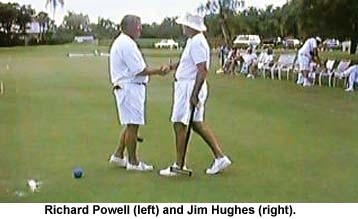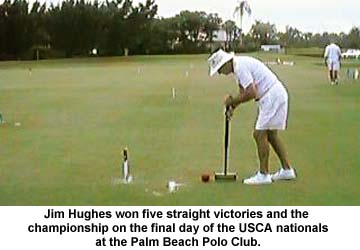

|
Back to |
| The Front Page |
| Archives |


|
VETERAN JIM HUGHES BECOMES AMERICA'S OLDEST NATIONAL CHAMP,
BESTING RELATIVELY NEWCOMER RICHARD POWELL IN DRAMATIC FINAL
|

In a field bright with gifted rookies young enough to be his grandchildren, veteran competitor Jim Hughes at the grand old age of 67 played the tournament of a lifetime. Winning five straight matches under Palm Beach skies in the final day of the 1996 USCA National Championships, croquet's oldest national champion claimed his well-earned laurel.
In the tense final match, Jim Hughes battled back from a 21-2 deficit, picked up a break as match time expired, and defeated relative newcomer Richard Powell 23-22 to bring to a dramatic end the most important tournament of the year in American croquet. HUGHES' FIRST ATTACK GOES AWRY, SETTING UP BREAK FOR POWELL
Hughes attacked first, rushing his yellow ball out of bounds where blue and black were joined. Powell played black away, but only about seven yards distant. Hughes then tapped blue with yellow, took off to black, and sent black out to partner in the #1 corner while yellow rolled up short of hoop #2. After blue passed, red began the break but failed immediately, taking position at #2, expecting to peel. Powell then hit in with black on his blue corner ball and ran the break. He got sloppy at 2-back and in scrambling to keep it together had to run all the way to rover to groom partner.
Powell's second break ended when his hoop shot at #6 trickled through, but not far enough for him to roquet red. Powell then two-balled through 1-back and 2-back, receiving a gift when Hughes neglected to clear yellow's deadness on opponents. Powell rushed again to 3-back and cleared, but left black on the lawn near his 3-back.
It was at this point that Hughes began the performance that was to earn him the national championship. With both balls on the boundary, Hughes cut-rushed yellow down the line, but only slightly into the court, leaving him an 18-foot roll to #2. He not only made the roll, but left himself a good rush to #3, which he easily scored. With black waiting on the lawn as a pioneer at #4, Hughes now had the three-ball break he needed to put the game away. HUGHES FALLS SHORT ON FIRST LONG BREAK, BUT GETS LUCKY RUSH
Hughes missed the wicket shot on penultimate, however, and was not able to give the crowd the expected stake-out of Powell's black ball. Fortunately for Hughes, black was deep at rover with no hit-in likely, blue was left at 4-back, and yellow was able to begin its turn with a decent rush to #2. Once again, the spent ball was waiting in pioneer position at #3, and Hughes was off again on another long break. Halfway through the break, Hughes ran into trouble again. After clearing 1-back with yellow, Hughes tried to rush blue to the #1 corner to pick up black but instead sent blue out of bounds on the roquet. TIME JOINS THE FRAY AS POWELL'S ALLY
Powell, content with a 21-17 lead with only eight minutes remaining in the game, stayed separated, enabling Hughes to score 2-back. On the next rotation, Hughes rushed to 3-back, scored, then mounted a long attack to the boundary on blue and black together seven yards east of the #2 corner, but with black about 18 inches inside the court. This was a most important 18 inches, allowing Hughes to roquet block on a hair-raising stroke that sent it to within 2 inches of the string. If he had ended his turn by knocking black out of bounds, the show would surely have been over. But now Hughes could catch the rush on blue, on which he ran 4-back, then rushed blue to rover, took off to red near 3-back, rushed back to penultimate, then scored the tying hoop. Hughes then rushed back to black, leaving red three feet from the North Boundary behind 1-back, gained a rush on black to rover, scored rover off blue, rushed blue deep to the South Boundary, then staked out both black and yellow. POWELL'S CHOICE: THE DEVIL OR THE DEEP BLUE SEA
Hughes now had a one-point advantage, and Powell's former ally - time - had turned against him with a vengeance. Blue was deep on the South Boundary and alive on red, the only other ball in the game, but red had been left within three feet of the opposite North Boundary. Powell had two desperation choices for saving the game: he could made a delicate 95-foot hit-in attempt on red, which would give him one stroke to make a 60-foot set-up shot at 4-back and an additional stroke to clear and tie the game. Or he could take a slightly shorter 70-foot angled shot at 4-back. Odd's makers would tell you that the hit-in was a higher percentage than the 70-foot wicket stroke. On the other hand, if you manage to make the hit-in on red, you have to execute another difficult set-up stroke to get wicket-shooting position at 4-back. So maybe the overall odds for winning the game are with making the one very difficult long wicket shot, rather than a series of shots. Such are the terrible choices croquet players must make, after only brief consideration, under the pressure of playing out, before the crowds, the most significant and widely observed croquet game of the year. Powell considered, then stalked his blue ball for the wicket shot. It missed the wicket wide to the right. Jim Hughes was the new champion. Hughes' crucial final win, tenuous though it appears, was his fifth winning effort of the day. He had already beaten Pat Roach. He had put Bill Berne away in a flawless 26-4 rout. He had bested the formidable Mik Mehas twice, going to the peg both times, 26-6 and 26-8. After losing his first game Friday and being relegated to the Losers Bracket, Hughes never looked back. To take the championship from the Losers Bracket he had to win, all told, eight games in a row against America' s best. Of the final game, four-time champion Archie Peck observed, "Hughes was real cool under fire, he kept his composure throughout the entire match, even when it looked like it was curtains." "IT WAS GREED, WHICH USUALLY COSTS ME, BUT THIS TIME, IT DIDN'T"
Hughes played gutsy croquet all day, including a five-foot, angled peel at rover in the second game against Mehas. "That was greed, pure greed and avarice, which usually costs me, but this time it didn't" commented the new champion. The one-point difference in the final reflects the caliber of Hughes' opponent, Richard Powell, who had taken a shorter road to the final. Powell came all the way through the Winners Bracket, beating Bill Berne to start the day. John Osborn defeated Powell in the first semifinal, but Powell controlled the rematch till the final turn, when Osborn missed his chance by muffing his second hoop, sending Powell on to the final. Champions of the lower flights were Leon Parker in the First Flight, David Maloof in the Second, and Tad Cassidy in the Third. Full tournament results and highlights will be posted later in the week.
Daily reports of the 1996 USCA nationals were written by Nate Weimerskirch, edited by Bob Alman, and designed by Webmaster Bob Henry, with digital photographs by David Gladstein.